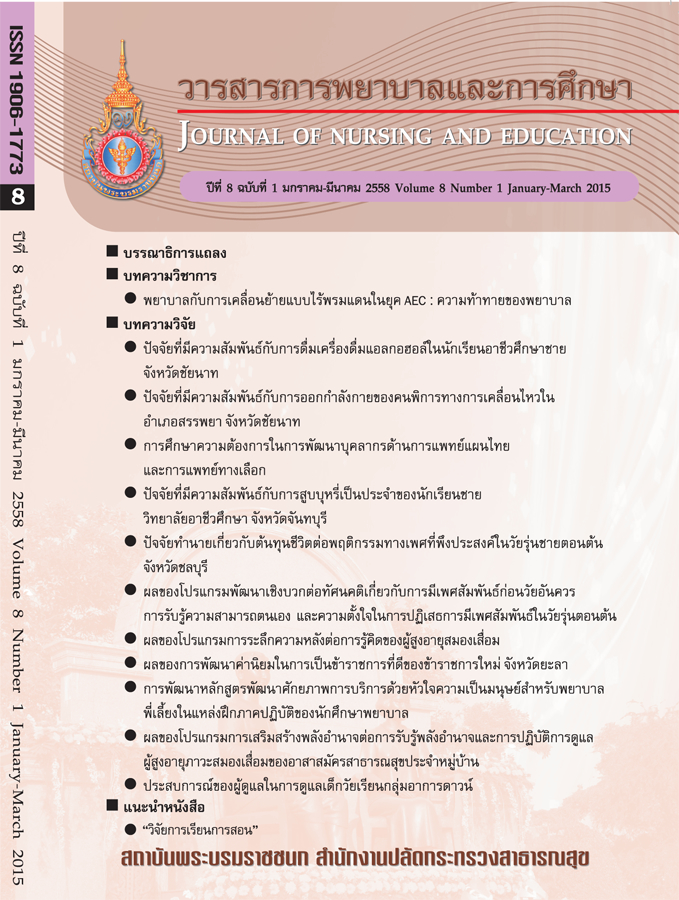ผลของโปรแกรมการระลึกความหลังต่อการรู้คิด ของผู้สูงอายุสมองเสื่อม*
คำสำคัญ:
reminiscence, cognitive function, dementiaบทคัดย่อ
บทคัดย่อการวิจัยครั้งนี้เป็นการวิจัยกึ่งทดลองแบบศึกษา 2 กลุ่ม แบบวัดซ้ำ (Repeated measurements)
โดยมีวัตถุประสงค์เพื่อศึกษาผลของโปรแกรมการระลึกความหลังต่อการรู้คิดของผู้สูงอายุสมองเสื่อมในสถานดูแลระยะยาว กลุ่มตัวอย่างเป็นผู้สูงอายุสมองเสื่อมระยะเริ่มต้นถึงระยะปานกลางที่พักอาศัยในสถานดูแลระยะยาว เลือกกลุ่มตัวอย่างแบบเจาะจง จำนวน 40 คน แบ่งออกเป็น 2 กลุ่มคือ กลุ่มทดลองและกลุ่มควบคุม กลุ่มละ 20 คน จับคู่กลุ่มควบคุมและกลุ่มทดลองที่มีคุณสมบัติคล้ายคลึงกัน (matched pair) ) ในด้าน อายุ เพศ ระดับการศึกษาซึ่งกลุ่มทดลองได้รับโปรแกรมการระลึกความหลังตามโปรแกรมเป็นระยะเวลา
8 สัปดาห์ ในกลุ่มควบคุมจะได้รับการพยาบาลตามปกติของสถานดูแลระยะยาว เครื่องมือที่ใช้ในการทดลองได้แก่ โปรแกรมการระลึกความหลัง แบบสอบถามส่วนบุคคล แบบทดสอบสมรรถภาพสมองเบื้องต้น ฉบับภาษาไทย และแบบประเมินความสามารถในการปฏิบัติกิจวัตรประจำวัน ตรวจสอบความเที่ยงโดยใช้สถิติ Cronbach’s Alpha โดยใช้วิธี Test – retest ค่าความเที่ยงของแบบทดสอบสมรรถภาพสมองเบื้องต้น ฉบับภาษาไทย (MMSE – T) และแบบวัดความสามารถในการดำเนินชีวิตประจำวัน Barthal ADL Index มีค่าเท่ากับ .97 และ .95 ตามลำดับ วิเคราะห์ข้อมูลโดยหาค่าเฉลี่ย ร้อยละ ส่วนเบี่ยงเบนมาตรฐาน และสถิติทดสอบที ผลการวิจัย พบว่า
1. การรู้คิดของผู้สูงอายุสมองเสื่อมหลังได้รับโปรแกรมการระลึกความหลังการทดลองทันที
เพิ่มขึ้นกว่าระยะหลังการทดลอง 4 สัปดาห์ หลังการทดลอง 2 สัปดาห์ และก่อนการทดลองอย่างมีนัยสำคัญทางสถิติที่ระดับ .05
2. การรู้คิดของผู้สูงอายุสมองเสื่อมกลุ่มทดลองที่ได้รับโปรแกรมการระลึกความหลังทันที ระยะหลังการทดลอง 2 สัปดาห์ และหลังการทดลอง 4 สัปดาห์ เพิ่มขึ้นกว่ากลุ่มควบคุมอย่างมีนัยสำคัญทางสถิติที่ระดับ .05
คำสำคัญ : การระลึกความหลัง การรู้คิด ผู้สูงอายุสมองเสื่อม
Abstract
Thai quasi-experimental research with repeated measures control group design research aimed to study the effects of reminiscence program on cognitive function of older people with dementia in long-term care facility in Bangkok. The first group of 20 participants was assigned in to a control group and the second group of 20 participants was assigned to an experimental group. Participants from both groups had similar characteristics in terms of age, gender and education. The experimental group underwent a reminiscence program and the control group received conventional nursing care. Reminiscence program was performed once a week for 8 weeks. The research instruments included Mini-Mentral state Examination Thai version 2002 (MMSE-T 2002). The reliability statistics Cronbach’s Alpha using test-retest values. Reliability of the Mini-Mentral state Examination Thai version 2002 and Barthel Index of Activities of Daily Living were .97 and .95, respectively. Data were analyzed using descriptive (mean, percentage, standard deviation), t-test statistics and one-way analysis of
variance repeated measures.
The research results were summarized as follows
1. The mean of cognition function among older persons with dementia in the experimental group after receiving the reminiscence program was significantly higher than the average score before undergoing the program (p < .05).
2. The mean of cognition function among older persons with dementia in the experimental group after receiving the reminiscence program was significantly higher than those who received conventional nursing (p < .05).
Keywords : reminiscence; cognitive function; dementia.






